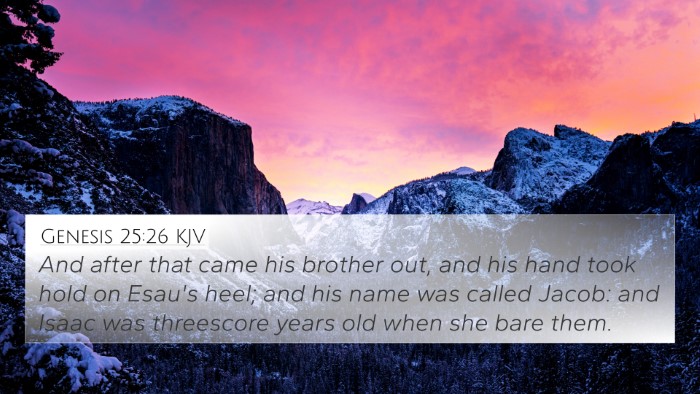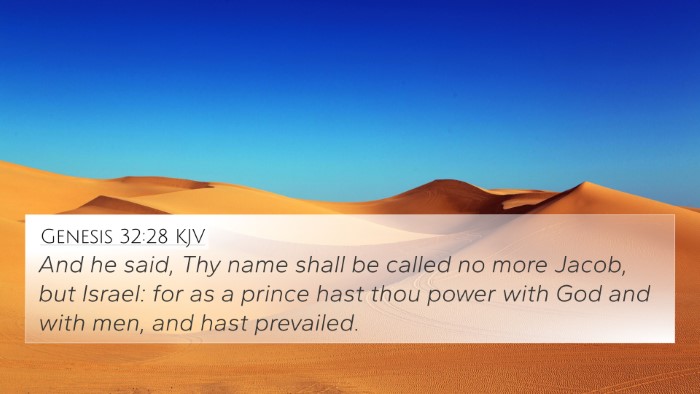Meaning and Interpretation of Genesis 27:36
Verse Text: "And he said, Is he not rightly named Jacob? For he hath supplanted me these two times: he took away my birthright; and, behold, now he hath taken away my blessing." (Genesis 27:36)
Contextual Background
The narrative in Genesis 27 revolves around the manipulation and eventual deception of Isaac, the blind patriarch, by his son Jacob, aided by his mother Rebekah. This chapter showcases themes of rivalry, deceit, and the sovereignty of God in the unfolding of His divine plan.
Insights from Public Domain Commentaries
- Matthew Henry: Henry emphasizes the character of Esau as one who traded his birthright for a meal, thus devaluing his inheritance. He interprets this as a lesson on the folly of prioritizing immediate gratification over lasting blessings.
- Albert Barnes: Barnes highlights that Esau's reaction is one of despair and indignation, recognizing that Jacob, whose name means 'supplanter', has taken what rightly belonged to him. This signifies the deep sense of loss Esau feels at being deprived of both his birthright and blessing.
- Adam Clarke: Clarke focuses on the implications of the name 'Jacob', suggesting that it reflects Jacob's character throughout the scripture. He views Esau’s lament as an expression of frustration over his own lack of foresight and the consequences of his actions in relation to his birthright.
Thematic Analysis
The verse captures the bitter tension between brothers and serves as a pivotal moment in the larger narrative of Israelite history. It reflects important themes such as:
- Sibling Rivalry: The ongoing tension between Jacob and Esau sets the stage for their tumultuous relationship.
- The Value of Spiritual Heritage: The exchange of birthright illustrates the critical importance of spiritual value over materialism.
- God's Sovereignty: Despite the deceit, this situation aligns with God's ultimate plan for Jacob to become the father of the Israelite nation.
Cross-References
Genesis 27:36 can be cross-referenced with several other relevant scriptures, enhancing the understanding of its message:
- Hebrews 12:16-17: "Lest there be any fornicator, or profane person, as Esau, who for one morsel of meat sold his birthright." This passage emphasizes that Esau's choice had dire spiritual consequences.
- Genesis 25:29-34: The initial sale of the birthright reflects Esau's indifference to spiritual matters.
- Genesis 28:1-4: Isaac blesses Jacob again, confirming the continued significance of Jacob's lineage.
- Malachi 1:2-3: The underlying prophecy where God expresses love for Jacob and hatred for Esau underscores the long-term ramifications of their actions.
- Romans 9:10-13: New Testament reflection on God's choice in Jacob over Esau ties back to divine sovereignty and purpose.
- James 1:14: The temptation leading to sin is examined, paralleling Jacob's deceptive act.
- Genesis 32:6: Jacob’s later confrontation with Esau provides a nice counterpoint to the earlier hostility expressed in Genesis 27.
Concluding Reflections
Genesis 27:36 serves as a poignant reminder of the complexities of family dynamics, the weight of decisions made in haste, and the overarching themes of God's plan in human lives. The connections between the verses enrich the narrative, demonstrating that scripture speaks to one another, providing a cohesive theological framework.
How to Use Bible Cross-References
To vary your study of this verse and its implications, consider these steps:
- Utilize a bible concordance to find related verses and to enhance thematic study.
- Engage in cross-reference Bible studies by comparing Old Testament events to their New Testament applications.
- Explore Bible reference resources to strengthen understanding of the cultural and historical context.
By linking scriptures and examining their connections, about themes of spiritual blessings, deception, and familial relationships, we deepen our understanding of God's timeless truths.






